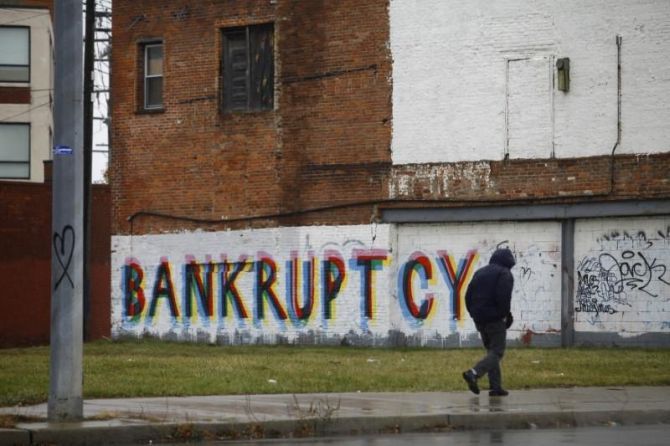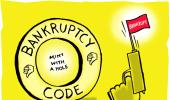Even though the powers of the board of directors stand suspended once a company’s insolvency process begins, it does not absolve the directors from actions taken up to two years earlier.

Under the Insolvency and Bankruptcy Code (IBC), appointment of a resolution professional marks the onset of insolvency resolution in a debtor company.
The powers of the board of directors of the company under duress stand suspended. This power is then vested and exercised in the professional, appointed by the National Company Law Tribunal.
However, this move does not absolve the directors from actions taken up to two years prior to commencement of the resolution process.
Often referred to as ‘twilight zone’ under insolvency terminology, this period of look back – of 12 months for regular transactions and 24 months for related party transactions - could come back to haunt many existing directors in the boards of companies going through financial stress and eventually entering the insolvency resolution process.
Corporate law experts say there is a significant shift in a director’s duties when a company is faced with the risk of insolvency.
When a company is financially stable the primary duty of a director under the Companies Act is to promote its success with reference to the interests of all shareholders.
However, under IBC, the discharge of duties by directors in the twilight period is with reference to the best interest of the creditors, says Sumant Batra, managing partner & head, insolvency practice, Kesar Dass B & Associates.
“The decisions taken in this period by the directors and officers of the enterprise could significantly influence or impact the outcome of the insolvency process when the debtor or the creditors formally commence it,” he says.
Experts say it is equally important for insolvency practitioners, debtor and creditors to be fully aware of the period that constitutes the twilight zone and the implication of actions taken by directors during this period.
“After commencement of the resolution process, the directors have to conduct themselves as per the provisions of the insolvency law,” he adds.
The Code allows a board member to support the resolution process at the request of the insolvency professional.
The shift in a director’s duties in the twilight period – from maximising the interest of all shareholders to one that protects the interest of creditors – could be tricky, say experts.
When a company is on the verge of insolvency, there is an incentive for directors to protect their own and shareholders’ interests, knowing the downside risk would fall wholly on the creditors.
Risky actions by a director at that point of time could seriously reduce the value of assets of a company, point out insolvency professionals.
The Code looks at all the actions of the debtor company from the point of view of whether these were carried out with intent to defraud creditors, says Sanjay Doshi, partner, KPMG in India.
So, what should the director in a financially-stressed company do when taking a call on whether his or her action is guided by best interests of the shareholders or the creditors?
According to Sai Venkateshwaran, partner and head of accounting advisory services, KPMG in India, several indicators of potential financial stress could be visible through key financial and non-financial metrics that are relevant for each business.
“It is important for the directors, including the audit committee, to closely evaluate these, especially when evaluating the validity of the going concern assumption for the company,” he says.
Legal experts say it is not possible to exempt a director from liability for negligence, default, breach of duty or breach of trust. However, a company can include an indemnity in favour of directors within its Article of Association in respect of any liabilities, costs, charges and expenses incurred in execution and discharge of their duties.
However, no indemnity or insurance is available in respect of fraudulent trading, adds Batra.
Obtaining Directors and Officers (D&O) insurance cover is not mandatory under law. However it is becoming a popular tool to mitigate some of the risks that independent directors (IDs) are exposed to.
“The extent of protection available to IDs would vary case-to-case, depending on the type and extent of the D&O cover,” says Venkateshwaran.
Experts say to satisfy their legal obligations, directors should keep the company’s position under constant review when in the zone of insolvency. They have to ensure that action taken by the company is not contrary to the best interests of the creditors.
“Sometimes, timely advice from an insolvency expert can prevent serious consequences for directors and the enterprise at a later time,” says Batra.
Lawyers may be consulted to determine whether any proposed transactions are inappropriate and could be the subject of scrutiny or expose the decision maker to risk.
Directors must consider the company's financial situation before incurring further liabilities or agreeing to large compensation or pension packages for departing management, adds Batra.
As a confidence building measure, directors should keep major creditors and investors informed of their actions, suggest insolvency professionals.
Directors of listed companies should ensure they make the appropriate disclosures regarding going concern status and the liquidity risks, they add.
Regular board meetings should be held as soon as the directors become aware that the company might be in financial difficulties. Legal experts say directors should insist on detailed minutes of these meetings and their discussions.
If a director is not satisfied with the operations of a company, he or she may as a final step consider resigning from the board. However, “resignation ahead of the insolvency process does not absolve the directors of any liability/penalty relating to their actions”, says Venkateshwaran.
“A director has to demonstrate that he or she acted diligently, including documenting decisions that do not have his or her consent or connivance,” he adds.
Photograph: Joshua Lott/Reuters











